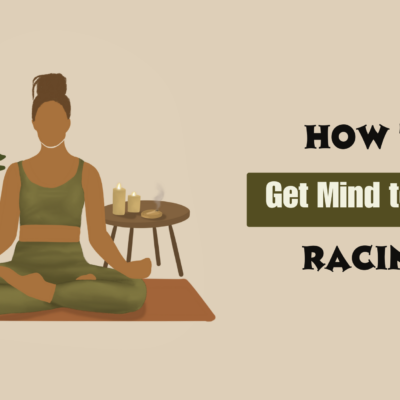How to Get Mind to Stop Racing: In the fast-changing world we are living in, it’s normal for our minds to race with thoughts, worries, and plans. This continuous mental conversation can lead to stress, anxiety, and problem-focusing. Learning how to quiet the mind is important for overall well-being and productivity. Hence, in this article, we will talk about some simple yet effective techniques to help calm a racing mind and encourage inner peace.
Also Read:
- Some Natural Mood Enhancers for Depression.
- 10 Tips to Become a Better Listener.
- How To Be Positive Everyday?
- Signs of an Emotionally Draining Person.
- My Job Is Too Stressful to Handle. What Can I Do?
How to Get Mind to Stop Racing?
Practice Mindfulness Meditation
Mindfulness meditation is a strong strategy for calming the mind and relieving racing thoughts. To practice mindfulness meditation, find a quiet and comfortable space to sit or lie down. Close your eyes and concentrate your attention on your breath.
Notice the sensation of each inhale and exhale, and allow your thoughts to come and go without judgment. If your mind starts to wander, try bringing your focus back to your breath. Start with just a few minutes of meditation each day and slowly increase the duration as you become more comfortable.
Engage in Deep Breathing Exercises
Deep breathing exercises are another useful way to calm the mind and ease racing thoughts. Find a relaxed position and take a deep breath through your nose, allowing your abdomen to grow.
Hold your breath for a few seconds, then exhale slowly through your mouth, letting go of any tension or stress. Repeat this method several times, concentrating on the rhythm of your breath. Deep breathing exercises can help activate the body’s relaxation reaction and encourage a sense of calm.
Practice Gratitude
Developing an attitude of gratitude can help redirect your focus away from racing thoughts and toward the present moment. Take a few moments each day to reflect on the things you are grateful for in your life.
This could be anything from a supportive friend to a beautiful sunset. Keeping a gratitude journal can be a helpful way to regularly remind yourself of the things that bring you joy and appreciation.
Engage in Physical Activity
Physical activity is not only useful for your physical health but can also help quiet the mind and reduce stress. Engage in activities that you enjoy, whether it’s going for a walk, practicing yoga, or dancing to your favorite music.
Exercise releases endorphins, which are chemicals in the brain that help improve mood and decrease anxiety. You should do at least 30 minutes of moderate exercise most days of the week to experience the mental health benefits.
Set Aside Worry Time
If you find yourself continually worrying about the future or ruminating on past events, try setting aside dedicated “worry time” each day. Choose an exact time and place to sit down and allow yourself to worry for a set period, such as 10 or 15 minutes.
During this time, write down your worries or concerns in a journal and explore possible solutions. Once the time is up, close the journal and mentally let go of your concerns until the next scheduled session. This technique can help calm racing thoughts and control them from taking over your entire day.
Set a Relaxing Bedtime Routine
A racing mind can make it challenging to relax and fall asleep at night, leading to insomnia and fatigue. Setting a relaxing bedtime routine can help signal to your body that it’s time to relax and prepare for sleep.
This could include activities such as reading a book, taking a warm bath, or practicing gentle stretches. Avoid screens and exciting activities before bedtime, as they can interfere with your body’s natural sleep-wake cycle.
Seek Professional Help if Needed
If racing thoughts stay irrespective of trying the above-mentioned techniques, or if they greatly hamper with your daily life, it may be helpful to seek professional help.
A mental health professional, such as a therapist or counselor, can work with you to identify the underlying causes of racing thoughts and develop strategies to handle them effectively. They may also recommend other treatments, such as medication or cognitive-behavioral therapy, depending on your personal needs.
At The End
Quieting a racing mind needs practice and patience, but it is possible with the right techniques and mindset. By including mindfulness meditation, deep breathing exercises, gratitude practices, physical activity, setting aside worry time, setting a relaxing bedtime routine, and seeking professional help if required, you can relax your mind and experience greater peace and well-being in your life. Start executing these techniques today and reap the benefits of a quieter, more peaceful mind.








